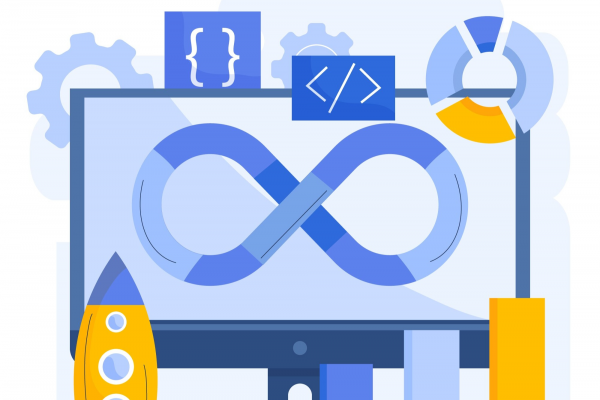Platform engineering is one of the most crucial topics in the software engineering arena. As per the report shared by Gartner, around 80% of the software engineering firms will have implemented platform engineering teams by the year 2026. But what is platform engineering? And how is it helpful?
Platform engineering, in brief, is the discipline of designing and building workflows and toolchains. Hence, this enables self-service capabilities for software engineering firms that operate within the cloud-native era. The platform engineers take up the responsibility of integrating a product that handles all of the operational aspects of an application’s lifecycle.
Currently, platform engineering is working towards streamlining the relationship between operations and developer teams. Thus, this approach will enhance productivity for the companies operating within the cloud.
DevOps & Cloud Native Development are Changing and Evolving with the Introduction of Platform Engineering
As for the software engineering arena, people are worried that DevOps is dusted within the cloud-native development space. But, with the rise of platform engineering, DevOps is going nowhere but changing how it executes. Such a shift in the role of integrating DevOps will help developers do more proficient work with less effort.
As companies across various industries are unsure of how to deal with the economic turmoil, this new DevOps will help them with the guiding principles.
All development platforms are set up for professionals to attain higher productivity by reducing cognitive load. Hence, platform engineering will help developers speed up the delivery of software without compromising on quality.
Platform engineering is more like a discipline that will constantly change when more commercial or packaged options are introduced. As of now, it is a concept that eases the entire cloud-native development cycle.
One of the most common ways companies implement platform engineering in association with their DevOps teams is to make them derive effectiveness with the least possible work. The trend is now making DevOps evolve into PlatformOps, and enhancing the developer experience.
Problems Associated with Traditional DevOps Approach
There’s potential for commercialization and dominance of the developer platform and platform engineering. In the usual practice, there was heightened developer frustration. The Kubernetes developers were disappointed with the new challenges that came along with cloud-native development and microservices.
With those challenges, came a complete paradigm shift, and the developers were expected to suddenly shift their practices and take on the cognitive load. Hence, the repetitive tasks were initiated, visibility into the services was reduced, and there was no roadmap for figuring out any specific tools that one needed to use.
As per a survey, the developers spent an average of 15 hours a week just on non-development tasks. Hence, how can companies expect productivity from their team when the existing solutions engage them in unwanted tasks?
The productivity was suppressed, and the developer experience was deteriorating. Another problem was with the mindset of developers! Very few developers are out there who want to experiment and use new techniques for a better development outcome. But on the other hand, most developers want predetermined pathways for shipping or running the code.
Therefore, most businesses today are in need of stability and security through replicability, consistency, and standardization. The need for controlling costs, ensuring security, and meeting customer demands comes at the expense of degraded creativity. The entire cycle relies on automation, processes, and people operating with traditional tools and standards.
Hence, this is where DevOps is of utmost help. DevOps is evolving with platform engineering to take on these scaling challenges. DevOps with platform engineering is a support model that clears out the pathway, reduces friction in the developer’s work, and minimizes complexity in the overall experience of developers.
Understanding the Evolution of DevOps and Cloud-Native Development with Platform Engineering
In short, platform engineering is more like a new stage for DevOps development. With it, the organizations will develop a shared platform for improving the overall productivity and experience of the developers. And that is possible by offering self-service alongside the operations.
By implementing platform engineering in DevOps, the management, monitoring, and deployment tools, practices, and processes are produced as reusable services and tools. Thus, they can be used across various use cases and engineering teams within the organization.
Platform engineering is responsible for speeding up the entire process of software delivery. The platform engineers will ensure that all application development teams work proficiently throughout the software development and delivery lifecycle. With the help of platform engineering, growing and preserving automation systems will help develop and ship the codes faster.
In the cloud native space, developers always need to gain knowledge about the infrastructure and what would happen after the code is shipped. If anything goes wrong, then the developer will be responsible for amending the code. When the developer knows the code’s dependencies, it is possible to troubleshoot and rectify the root problems.
Platform engineering enables the professionals with developer platforms, which enable them to:
- Enables PlatformOps or DevOps to support the self-service motion and enhance its adaptation. Hence, the time and focus invested on strategic projects and improvements will be increased.
- Better performance, security, and compliance measurement is enabled because the resource and operational data will be centralized in the data lake of the platform.
Conclusion
Platform engineering is the concept that allows companies to enable and support their development teams by building an internal developer platform. It is the emerging technology that has the potential to accelerate the delivery of apps at a pace at which the business value increases.
It is a concept, the emergence of which is a response to the rising complexity of modern-day software architectures. The capabilities of the developer or engineering platform depend on the necessities of the end users. This concept aims to achieve the goal of providing a self-service and frictionless developer experience to offer the right empowerment to developers for producing valuable software solutions.
If you want to learn more about platform and product engineering, then check out this service page by STL Digital.
FAQs
Platform engineering is a thriving trend that modernizes the entire software delivery journey, especially for digital transformation. It enhances the experience of developers and productivity by offering automated infrastructure solutions. It is a trending integration that promises to optimize the developer’s experience. It accelerates the delivery of customer value for the product teams.
Internal developer platforms are outcomes of utilizing platform engineering within DevOps approaches. Companies use these developer platforms to minimize the operational load on their DevOps teams. Moreover, these platforms also provide the DevOps teams with necessary abstractions for the development approaches.
Some of the important platform engineering tools that are used within the software development environment are as follows:
Kubernetes, for container orchestration
ArgoCD for Continuous Deliveries
Docker for hosting applications
Terraform, for automating the infrastructure provisioning aspects
Crossplane, for managing the Cross Kubernetes Infrastructure
Qovery, for previewing the environment
GitLab CI for Continuous Integration
Humanitec, used for the Internal Development Platform
The cloud-native approach is responsible for deploying the codes faster and with added efficiency. And DevOps extends its support to that goal by enabling smoother collaboration with automated processes and tools. With platform engineering in play, DevOps proficiency is enhanced further. Hence, cloud-native development and DevOps have become more advanced in their service executions.



